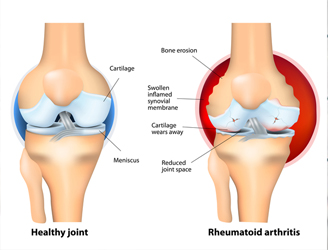
Rheumatoid Arthritis
The rehabilitation management of individuals with rheumatoid arthritis is imperative to decrease the potential long-term disabilities as noted above. Specifically, individuals with rheumatoid arthritis are at risk for decreased flexibility, muscle atrophy, decreased muscle strength and reduced cardiovascular endurance.
Deficit in such areas will lead to functional compromise and increased health care expenditures. Therefore, a multifactorial approach utilizing medications and rehabilitative techniques is necessary.
Fortunately, under proper counseling, individuals with rheumatoid arthritis can safely exercise, improving overall physical fitness, greater ease for activities of daily living and an improved sense of well being.
Rehabilitative techniques include appropriate periods of rest and activity modification; therapeutic modalities such as heat/cold or electrical stimulation; bracing and adaptive equipment.
WE TREAT FOR
- Osteo Arthritis (Knee Pain)
- Peri Arthritis (Shoulder Pain)
- Rheumatoid Arthritis
- Spondylitis (Neck Pain)
- Sciatica (Back Pain)
- Fracture Rehabilitation
- Muscle & Joint Pains
- Spinal Disc Problems
- Hemiplegia (Paralysis)
- Paraplegia
- Quadriplegia
- G.B. Syndrome
- Brachial Plexus Injury
- Wrist drop & Foot drop
- Club Foot
- Ligament Injuries
- Tennis elbow
- Golfers Elbow
- Toritcollis
- Plantar Fasciitis (Heel Pain)
- Hip & Knee replacement Rehabilitation
- Ankylosing Spondylitis
- Bells Palsy
- Brusitis
- Achilles Tendonitis
- Carpal Tunnel Syndrome
- Piriformis Syndrome
- Tenosynovitis
- Fibromyalgia
- Prenatal & Post Natal Training
- Cupping Therapy
- Unweighing System
- Latest Laser therapy Equipment
- TENS
- Spinal Traction
- Continuous Passive Movement(C.P.M)
- Interferential Therapy(IFT)
- Hydrocollator Therapy
- Ultra Sound Therapy
- Muscle Stimulator